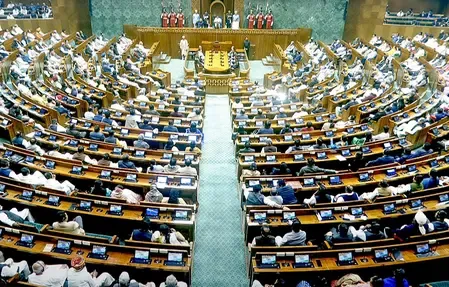2024 Bill Amends Waqf Act: Not the First Time

Synopsis
Key Takeaways
- The Waqf (Amendment) Bill 2024 is not the first amendment to the Waqf Act.
- The 2013 amendments were based on recommendations from a High-Level Committee.
- The Bill aims to rename the Waqf Act to a more comprehensive title.
- It seeks to enhance the management of waqf properties.
- Clear definitions and representation are key goals of the Bill.
New Delhi, April 1 (NationPress) The Waqf (Amendment) Bill 2024, which has sparked significant public discourse and drawn criticism from Opposition parties, is not the inaugural attempt to amend the Waqf Act, 1995. A similar modification was instituted by the UPA government back in 2013.
The Statement of Objects and Reasons of the Waqf (Amendment) Bill 2024 states that "comprehensive amendments were made in the Act in the year 2013."
It further articulates: "Despite these amendments, it has been noted that the Act still necessitates additional enhancements to effectively tackle issues pertaining to the authority of the State Waqf Boards, the registration and survey of waqf properties, and the removal of encroachments, alongside redefining the concept of waqf itself."
The amendment in 2013 was based on the suggestions from the High-Level Committee chaired by Justice (Retired) Rajinder Sachar and the findings of the Joint Parliamentary Committee on Waqf and Central Waqf Council, following extensive consultations with various stakeholders.
A primary aim of the Bill 2024 is to rename the Waqf Act, 1995 to the Unified Waqf Management, Empowerment, Efficiency and Development Act, 1995.
Moreover, the Waqf (Amendment) Bill 2024 intends to clearly delineate "Waqf" as a property dedicated by any individual practicing Islam for a minimum of five years who possesses ownership of said property, while also ensuring that the establishment of Waqf-Alal-Aulad does not infringe on women's inheritance rights.
Additional goals of the Bill encompass: eliminating the provisions concerning "Waqf by user"; assigning the duties of the Survey Commissioner to the Collector or another official not lower than the rank of Deputy Collector as nominated by the Collector for the survey of waqf properties; ensuring a diverse composition of the Central Waqf Council and the State Waqf Boards that includes representation from Muslim women and non-Muslims, and establishing a separate Board of Auqaf for Boharas and Aghakhanis.
Another significant objective of the Waqf (Amendment) Bill, 2024 is to amend the Waqf Act, 1995 to address the challenges faced in regulating and managing waqf properties. The Amendment Bill aims to enhance the administration and management of waqf properties across India.
It seeks to rectify the deficiencies of the Act and boost the effectiveness of Waqf boards by implementing modifications such as streamlining the registration process and amplifying the use of technology in managing waqf records.
The Waqf (Amendment) Bill 2024 is anticipated to be presented in the Lok Sabha on Wednesday, prompting the ruling BJP and the Opposition parties, including Congress and the Samajwadi Party, to issue directives to their MPs for the subsequent three days.
The ensuing discussion and approval of the Bill are also viewed as an opportunity for Prime Minister Narendra Modi and his government to underscore the NDA's numerical strength in the lower house.







